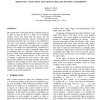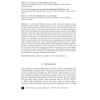1207 search results - page 143 / 242 » Modelling and improving human decision making with simulatio... |
WSC
1998
14 years 11 months ago
1998
We consider how to efficiently allocate computing resources in order to infer the best of a finite set of simulated systems, where best means that the system has the maximal expec...
MONET
2006
14 years 9 months ago
2006
In the future Wireless Internet, mobile nodes will be able to choose between providers offering competing services at a much finer granularity than we find today. Rather than month...
TIM
2011
14 years 4 months ago
2011
—Estimating latency between the hosts in the Internet can play a significant role in the improvement of the performance of many services that use latency among hosts to make rout...
ACMICEC
2007
ACM
15 years 1 months ago
2007
ACM
Recommender systems are intelligent E-commerce applications that assist users in a decision-making process by offering personalized product recommendations during an interaction s...
CONTEXT
2007
Springer
15 years 4 months ago
2007
Springer
: The needs-based information supply for medical workplaces is a necessary condition in order to ensure a maximum quality of medical care. A survey conducted by the Fraunhofer ISST...


